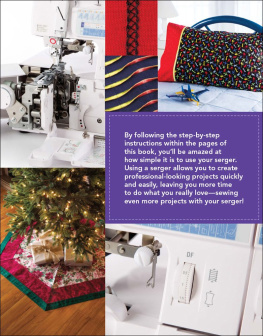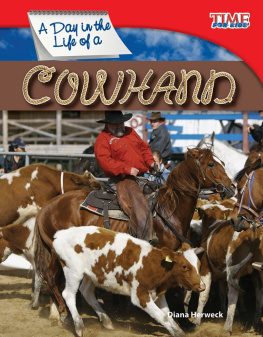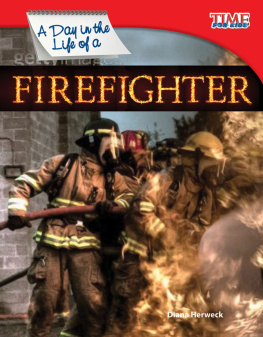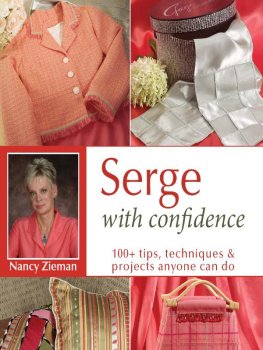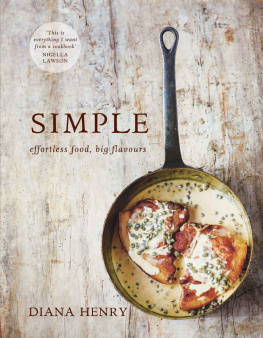Diana Cedolia - Learn Simple Serging
Here you can read online Diana Cedolia - Learn Simple Serging full text of the book (entire story) in english for free. Download pdf and epub, get meaning, cover and reviews about this ebook. year: 2015, publisher: Annies, genre: Home and family. Description of the work, (preface) as well as reviews are available. Best literature library LitArk.com created for fans of good reading and offers a wide selection of genres:
Romance novel
Science fiction
Adventure
Detective
Science
History
Home and family
Prose
Art
Politics
Computer
Non-fiction
Religion
Business
Children
Humor
Choose a favorite category and find really read worthwhile books. Enjoy immersion in the world of imagination, feel the emotions of the characters or learn something new for yourself, make an fascinating discovery.
- Book:Learn Simple Serging
- Author:
- Publisher:Annies
- Genre:
- Year:2015
- Rating:4 / 5
- Favourites:Add to favourites
- Your mark:
- 80
- 1
- 2
- 3
- 4
- 5
Learn Simple Serging: summary, description and annotation
We offer to read an annotation, description, summary or preface (depends on what the author of the book "Learn Simple Serging" wrote himself). If you haven't found the necessary information about the book — write in the comments, we will try to find it.
Learn Simple Serging — read online for free the complete book (whole text) full work
Below is the text of the book, divided by pages. System saving the place of the last page read, allows you to conveniently read the book "Learn Simple Serging" online for free, without having to search again every time where you left off. Put a bookmark, and you can go to the page where you finished reading at any time.
Font size:
Interval:
Bookmark:
Pattern Services and Revisions
If you are an Annies customer and have a question about the instructions on a pattern you have purchased, please visit:
http://www.anniescatalog.com/pages/customer_care/pattern_services.html
Simple
Serging
Diana Cedolia

Why Use a Serger?
Have you ever wondered what a serger can do for you? It will streamline your sewing experience while creating professional-looking seams and hems, and decorative topstitching.
Sergers have come a long way since they were introduced to the home-sewing market in 1969. Todays machines are far more versatile in their usefulness and capability, and they make the early two- or three-thread sergers seem primitive in comparison. Depending on the brand and model, your machine may accommodate five or more threads, have special attachments and even include a computerized stitch advisor.
The basic function of a serger is really quite simple: It simultaneously sews a seam while it trims the fabric edges and encases them in neat, even stitches. And thanks to a differential feed system, which is available on most modern machines, sewing with knits is a breeze. This system consists of two feed dogs working together to evenly draw in and push out the fabric, eliminating annoying stretching and puckering.
The nine projects that are included in this book are designed to teach important basics. Most can be completed using only a serger. (However, the Ribbon Weave T-Shirt, the Take-a-Bow Tree Skirt, the Fiesta Tiered Skirt and the Stipple-Chic Clutch require a sewing machine for topstitching.)
Lets get started! As you create, you will grow to love your serger as much as I love mine.
Happy Serging!
Diana
Meet the Designer

Before discovering a serger, Diana Cedolia made clothes with a sewing machine. No matter what I tried, from zigzagging seam edges to steam pressing hems and collars, the clothes still looked homemade. Then she bought a serger, and she never looked back. Diana began making clothing that looked as if it had come from a designer boutique, and after making a new wardrobe, she made doll clothes, linens, quilts and throw pillows. When using a serger, all fabrics from slinky knits to crisp cottons take shape quickly and look great.
Diana lives in Florida with her husband, Pat. There she teaches hands-on serging classes, and when asked about what her students most want to make, she replied, They want to make anything that they can finish in one or two class sessions and, luckily, sewing with a serger makes this possible. They like to learn about construction sequence and about all of the handy techniques that I have discovered over the past several years.
With her business partner, Kothy Haferstat, Diana designs quilt patterns for longarm quilting machines, and embroidery patterns for embroidery machines. The two also produce instructional DVDs for embroidery software. Their products are available under the name Simply Everything.
Table of Contents
The first step in successful serging is understanding your machines features and how to use them. Begin by locating and learning about the fundamentals of your machine. The following illustration is a generalized look at todays serger parts.
Carefully read the manufacturers manual to familiarize yourself with each component of your serger and what its particular function is. Keep your manual nearby during project construction for easy reference.
A) Chain Stitch Looper (Part of the Lower Looper System)
B) Feed Dogs
C) Hand Wheel
D) Lower Knife
E) Lower Looper
F) Lower Looper Tensions
G) Needles
H) Needle Thread Tensions
I) Presser Foot
J) Spool Holders for Thread
K) Thread Guide
L) Upper Looper Tension
M) Upper Knife
N) Upper Looper
O) Front Cover
P) Stitch Finger
Q) Differential Feed
R) Stitch Length

Needles, thread, specialty feet and sewing notionsonce you have the right supplies your serger will take you places you could only dream of going with a regular sewing machine.
In this section, well help you select the best products to use for project success. Get ready to achieve professional-looking results and to explore endless creative options!
Check your owners manual to see if you can use conventional sewing machine needles or if your serger requires special serger needles. Selecting the correct needle for the fabric, thread and stitch type can prevent all kinds of frustration including broken needles, broken thread, holes or snags in the fabric, puckered seams and uneven stitches. Universal, ball point, embroidery and quilting are among the most popular specialty needles.

Sizes/Features: 60/8 to 120/19. Slightly rounded point is rounded enough for stitching knits, yet pointed enough for stitching woven fabrics.
Use/Fabrics: General stitching on woven and knit fabrics in a wide range of weights.

Sizes/Features: 70/10 to 100/16. Point is more rounded than universal point.
Use/Fabrics: Needle slides between yarns of knits instead of piercing them, eliminating risk of snags or holes. Good for spandex and interlock knits that run easily; also good for creating even stitches on heavy knits.

Sizes/Features: 75/10 to 90/14. Large eye and deep scarf are designed to protect thread while stitching dense designs at high speeds. The scarf is the indentation on the back of the needle that allows bobbin thread to pass smoothly through the needles eye.
Use/Fabrics: Machine embroidery with rayon or other specialty threads. Use on any fabric finish or weight.

Sizes/Features: 75/11 and 90/14. Sharp, tapered point.
Use/Fabrics: Designed for stitching through multiple fabric layers and intersecting seams. Use to piece quilt tops and to quilt through multiple layers.
Serging allows for the use of a wide variety of threads. Use heavyweight thread, decorative thread or specialty serger yarns in the loopers to create embellishments that cant be duplicated with a standard sewing machine.
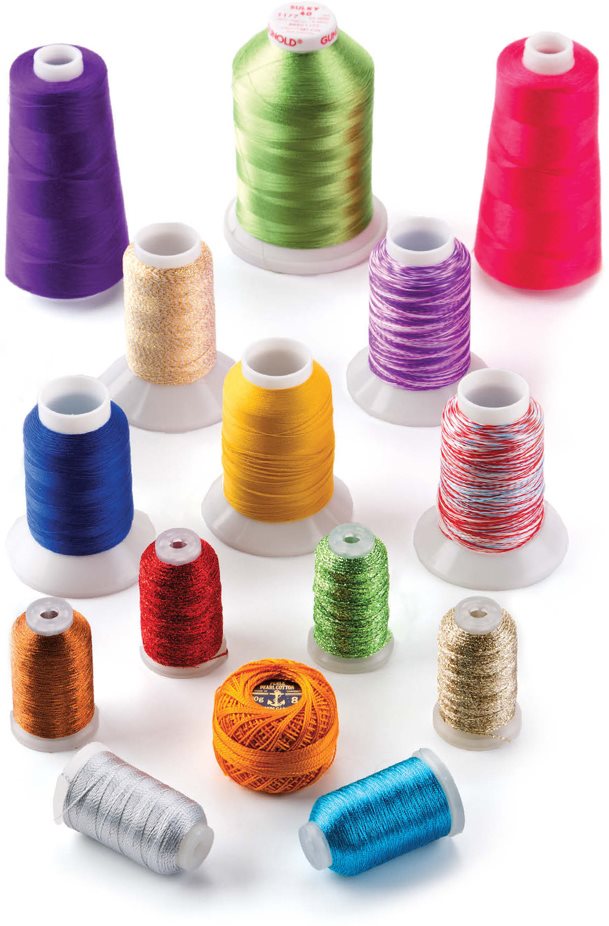
Font size:
Interval:
Bookmark:
Similar books «Learn Simple Serging»
Look at similar books to Learn Simple Serging. We have selected literature similar in name and meaning in the hope of providing readers with more options to find new, interesting, not yet read works.
Discussion, reviews of the book Learn Simple Serging and just readers' own opinions. Leave your comments, write what you think about the work, its meaning or the main characters. Specify what exactly you liked and what you didn't like, and why you think so.

